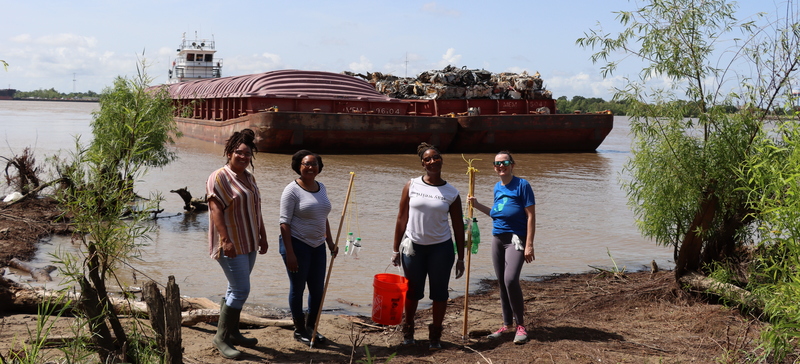
Waste
Trash, litter, rubbish. Disposing of materials we no longer want or can no longer use generates waste. Common kinds of waste include municipal solid waste, wastewater, and hazardous waste.
This is a page dedicated towards the development and exploration of Public Lab tools and resources to help understand the world of waste. Ideas range from landfill monitoring and mapping landfills to developing a trash can with built-in scale and household composting bin.
Lead image: @a1ahna, CC BY SA
Questions
| Title | Author | Updated | Likes | Comments |
|---|---|---|---|---|
| How subsurface gasses migrate and what allows them to dissipate? Landfill gasses | @denissebn_06 | over 3 years ago | 0 | 4 |
| can i use a spectrometer to sense food wastes and use an arduino to make it light a led accordingly? | @tasneim3mon3em | over 4 years ago | 0 | 1 |
| What do you do with charcoal from a water filter? | @permaculturegardener | over 5 years ago | 0 | 5 |
| How can I identify bits of plastic from the beach in an image? | @jlev | over 6 years ago | 2 | 17 |
Activities
| Purpose | Category | Status | Author | Time | Difficulty | Replications |
|---|---|---|---|---|---|---|
| Community-level Odor Mapping Site | - | - | @sarasage | - | - | 0 replications: Try it » |
| SoCal Waste Stream Mapping at Learn Beyond the Book in Santa Clarita | - | - | @sarasage | - | - | 0 replications: Try it » |
Activities should include a materials list, costs and a step-by-step guide to construction with photos. Learn what makes a good activity here.
Research notes
Projects and resources:
- Tracking Boston's municipal solid waste (from Claire): https://docs.google.com/viewer?a=v&pid=forums&srcid=MDg4NzcxNDk1MTQ0NzAzNDA0MjMBMDA1MDI1MTE0MjY5MzA5OTEyOTUBTXo5VHRzM2lTdnNKATQBAXYy
- EPA Database of landfill locations. Includes a record of historical/current violations of environmental policy: http://echo.epa.gov/?redirect=echo
- Landfill Club: Project from EcoHack 2014. has more data about landfills in MA. Note: This doesn't show historic landfills: http://landfill.club
- Massachusetts' closed landfills. Page with info on Mass's closed landfills that might be helpful for you: http://www.mass.gov/eea/agencies/massdep/recycle/solid/landfills-transfer-stations-and-compost-sites.html
- Basurama- A small study of waste places in Cambridge: http://meipi.org/cambridgewaste.categories.php It was part of the exhibition at MIT: http://basurama.org/transtrash/projects/ from Basurama. Map can be found here: http://meipi.org/cambridgewaste.map.php?id_entry=30
- Find a Landfill Near You http://landfills.herokuapp.com/ (in progress) This is something made by Nick Johnson with data from the EPA. It includes landfills as well as any facility licensed to handle msw. The idea here to was to find a landfill near you.
- MIT's Senseable City Lab TrashTrack http://senseable.mit.edu/trashtrack/index.php?id=1 Their project tracks where trash actually goes using GPS-enabled tools. This seems related to but potentially separate from identifying where the landfills are. Might be an interesting peripheral study. Also, there are some interesting data visualizations of specific trash items here: http://senseable.mit.edu/trashtrack/visualizations.php?id=2
- Crowdcrafting project to identify landfills from satellite images, http://crowdcrafting.org/app/landfill/
- Open Trash Lab, http://www.opentrashlab.com/projects
Challenges: Ideas for monitoring landfills:
Wifi Enabled Trashcan Scale (concept)
This trashcan has a builtin scale which automatically logs its daily weight online wirelessly. This joins the group 'internet of things' but could help keep track of exactly how much trash an individual or household produces. Could also be implemented into workplaces.
Steps to build: 1) Hack digital scale to add wifi capabilities. 2) Design method in which a trash can is placed on top
*tracking daily waste numbers across communities could be tremendously useful in understanding more precisely how much municipal solid waste is produced annually.
Landfill Monitoring Kit
This kit will include items needed to take a small soil sample in order to test for various toxins, metals, etc... A water monitoring kit - for nearby waterways to test for contaminates in the water. (These are just suggestions for monitoring landfills. I actually have no idea what would be useful)
Landfill Methane Mapping
Methane Balloons? - Landfills are a leading source in methane emissions across the country. Could we attach lowcost methane sensors to balloons and "Methane Map" landfills?
Landfill Identification and Tracking
The Environmental Protection Agency has a database containing data about all of the landfills in the country. It would enlightening to gather citizen stories and documentation of each of these landfills aside from the EPA database. This initial map was created to use the EPA database to locate all of the landfill in the country on one map. Users can then identify nearby landfills and see, via google maps, what the landfill is like from above. Expanding this map to include citizen gathered data on each landfill individually help formulate a better understanding of landfills around the country.
Current example
Home Composting Kit
I'm sure everybody and their brother has thought about this, but when I try and find something online, nothing exists. The home composting kit would be everything you need to easily compost at home. I imagine the kit to be similar to a trash can, but with many various levels to allow for the various steps in composting. - To be totally honest, I only have a basic understanding of how to compost but I fully believe there must be a simple way (via a product) to help people with in-house composting. -
Maybe something like this. Useful scientific research
Wall-E Robot to collect waste
This is all about making a Wall-e stye robot to collect and process waste. This is interesting in both bringing the character to life which represents the 'solution' to our increasingly growing waste stream as well as actually making a robot that could collect waste more efficiently. I also see potential for creating a mascot for waste as well as an opportunity to push the waste conversation forward.
Next steps: Design a diagram of what this robot would do. Ideas: simple moving trash can, add environmental sensors, focus on one item (organics or aluminum can crusher), maybe it is a mini waste to energy robot to power your home? etc...